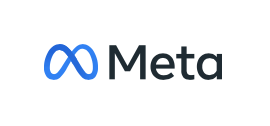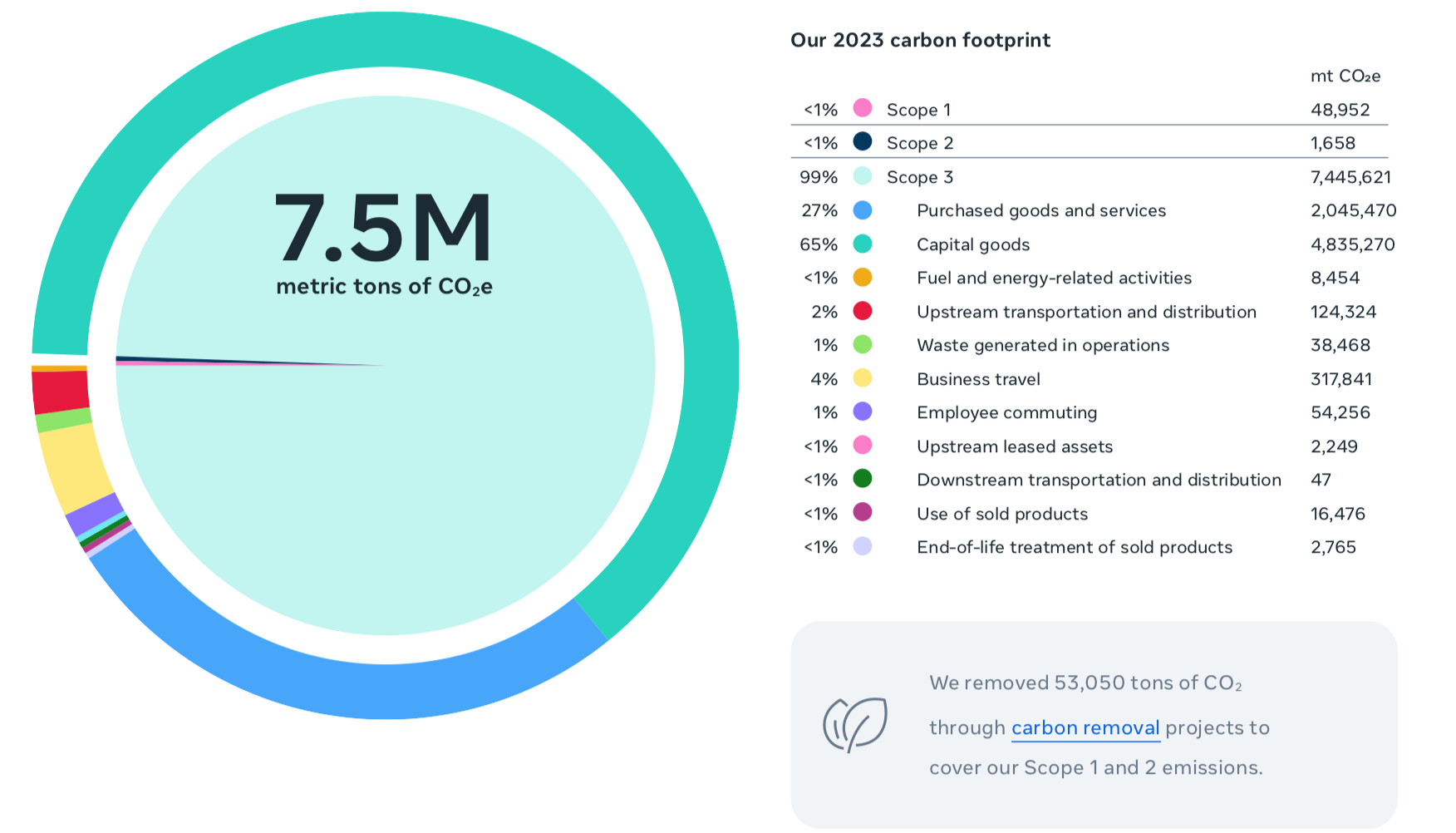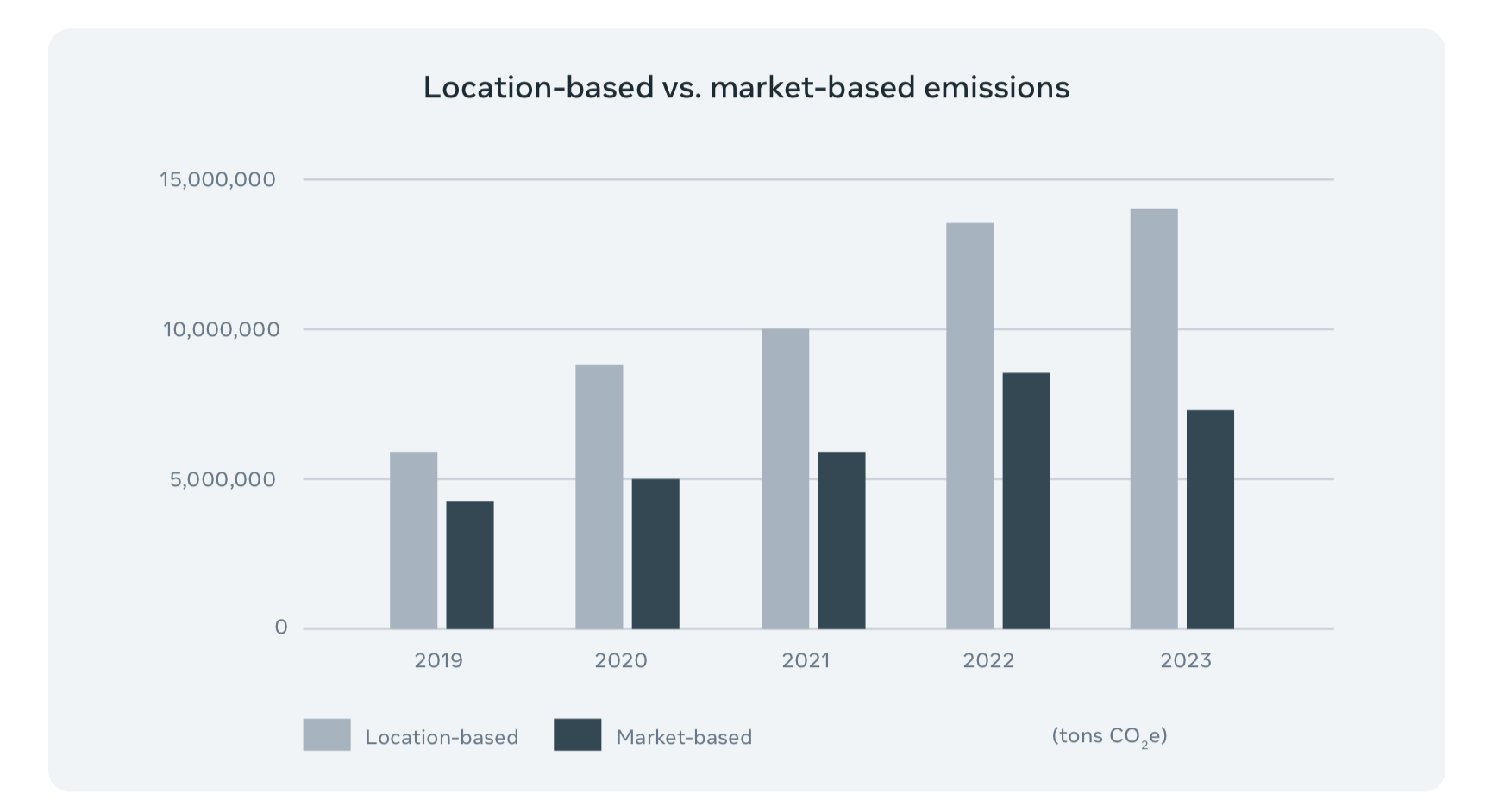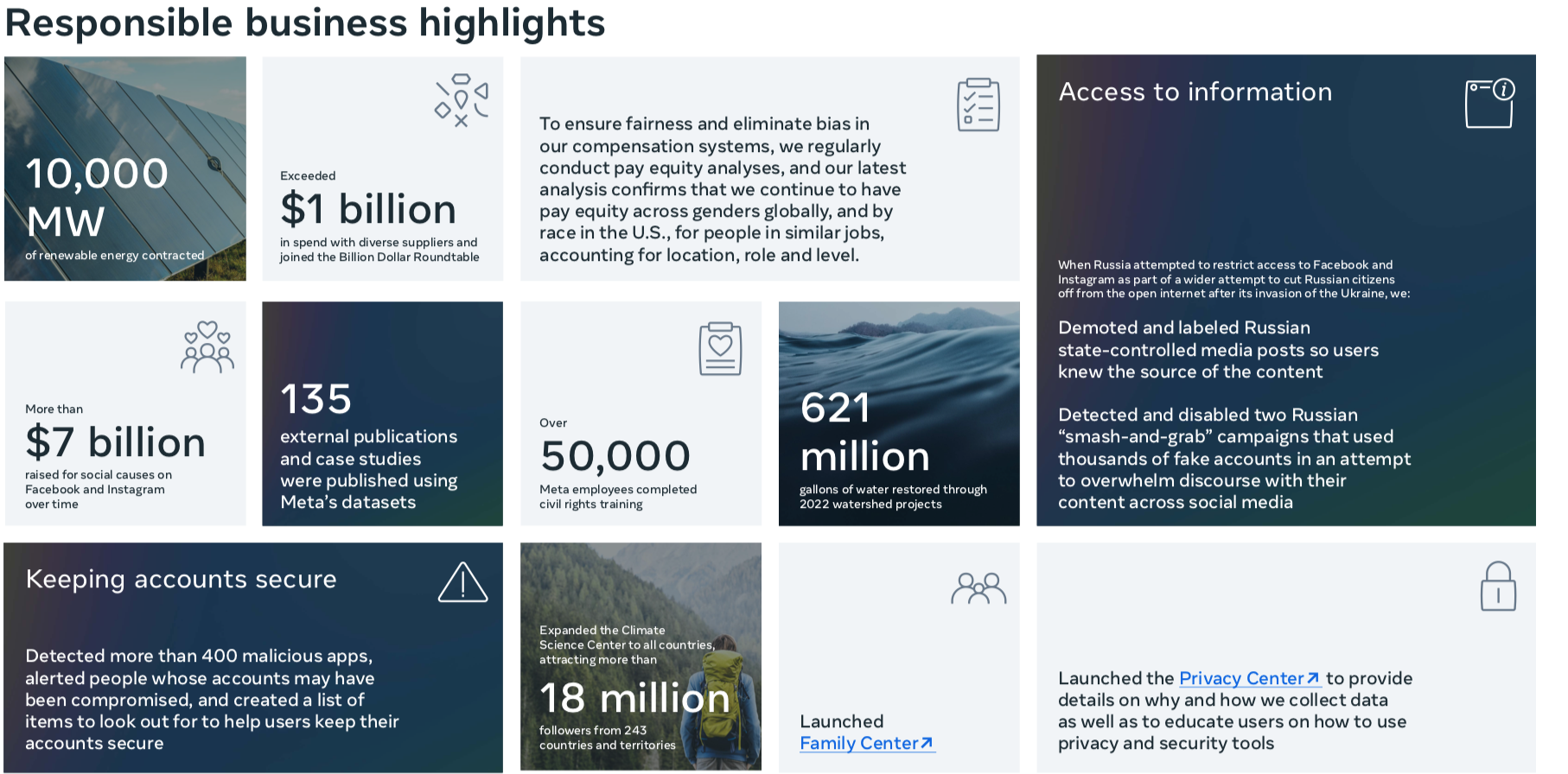CEF Lead Executives
-
DEVON LAKEItem Link List Item 1
Head of Net Zero Strategy
Devon is the Head of Net Zero Strategy at Meta, where she leads carbon reduction efforts across the company in line with Meta’s commitment to achieve net zero in its value chain by 2030. Prior to joining Meta, Devon was the Senior Director of Net Zero Solutions at ENGIE Impact where she advised companies on net zero strategy and execution. In her career, she has held both corporate and nonprofit leadership positions in organizations focused on decarbonization, ecosystem protection, and social justice. She has a Bachelor’s from Stanford University and a Master’s from Harvard University.
-
SYLVIA LEEItem Link
Head, Climate
Sylvia leads Meta’s Net Zero program, and she initiated Meta’s water and biodiversity sustainability programs. Previously, she built the climate and water resiliency portfolio at the Skoll Global Threats Fund. Sylvia began her career working as a consulting engineer on the design and construction of water projects in the United States and the United Kingdom. She went on to serve as the Associate Director at the World Economic Forum’s Environmental Initiative in Switzerland, where she helped raise global awareness of climate and water as key global risks. She was also on the World Bank’s South Asia team that focused on climate resiliency and transboundary water challenges. Sylvia is an engineering graduate of McGill University and MIT.
-
AMANDA GARDINERItem Link List Item 2
Sustainability Innovation and Engagement
Amanda Gardiner is a corporate sustainability and social responsibility executive with extensive experience driving strategy, building innovative partnerships, and leading global teams to improve ESG performance in multinational companies. She leads the Facebook team focused on: (1) Leveraging FB’s platforms, products, capabilities, and resources to maximize the company's positive sustainability impacts and inspire climate action; and (2) Responding to evolving stakeholder needs, issues, and trends to ensure continuous sustainability improvement. Prior to joining Facebook, Amanda held senior positions at Verizon and Pearson.
-
LESLIE COLLINSItem Link
Sustainability Director, Responsible Supply Chain
Leslie is responsible for driving the overall vision and strategy of the company supply chain social responsibility program, including supplier environmental performance, fair and ethical treatment of workers, driving the company’s hardware circular economy strategy and leading the Conflict Minerals disclosure development and filing with the SEC. Leslie joined Meta’s Sustainability function in 2017 and is based in Fremont, CA. Prior to Meta, she was at HP and Hewlett Packard Enterprise nearly 20 years and was the Global Manager of HPE’s Supply Chain Responsibility team. Additionally, at HP she held Global Social and Environmental Responsibility leadership positions in managing EU product hazardous material substance programs. She has served on the U.S. Green Building Council’s (USGBC) Northern Colorado Board. She received a Bachelor of Science in Chemical Engineering and Mathematics and Computer Science from Colorado School of Mines in Golden, Colorado.
Latest Sustainability Report
(Sept 2024)
Highlights
- Maintained net zero emissions across global operations and matched 100% of electricity use with renewable energy since 2020.
- 100% of data centers are certified LEED Gold or higher
- 91% of data center construction waste was recycled in 2023
- 28% of suppliers, based on their contribution to Meta’s emissions, have set science-aligned emissions reduction targets as of the end of 2023
- 18 operational water restoration projects returned more than 1.5 billion gallons of water to high- and medium-water stress regions in 2023
- Co-launched the Clean Energy Procurement Academy (CEPA) alongside the Clean Energy Buyers Institute and other companies
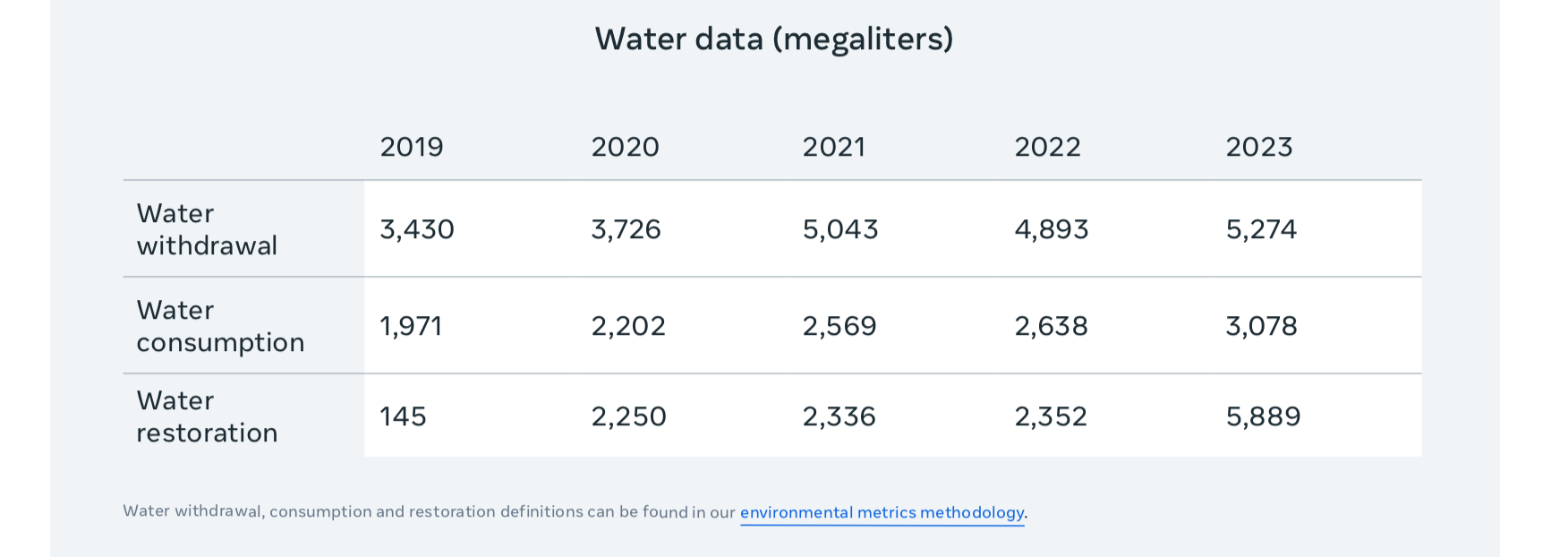
Highlights
- Continues to maintain net zero emissions in global operations (since 2020);
- Supports operations with 100% renewable energy, and has contracted over 10,000 MW of renewable energy.
- In 2022, the company’s water restoration projects returned 621 million gallons of water to high and medium water stressed regions.
- 100% of Meta’s data centers achieve at least LEED Gold certification.
- Took several steps in 2022 to advance the sustainability of its products, including using sustainable materials in products and packaging; shifting some shipping to ocean freight; extending the life of products; and completing lifecycle assessments to reduce footprints of future generations of products.
- Spent more than $1 billion with diverse suppliers and joined the Billion Dollar Roundtable.
- Over 50,000 employees completed civil rights training to better identify and address civil rights issues in their work.
- Underrepresented people made up 45.4% of workforce globally, and 47.9% in the U.S., by the end of 2022.
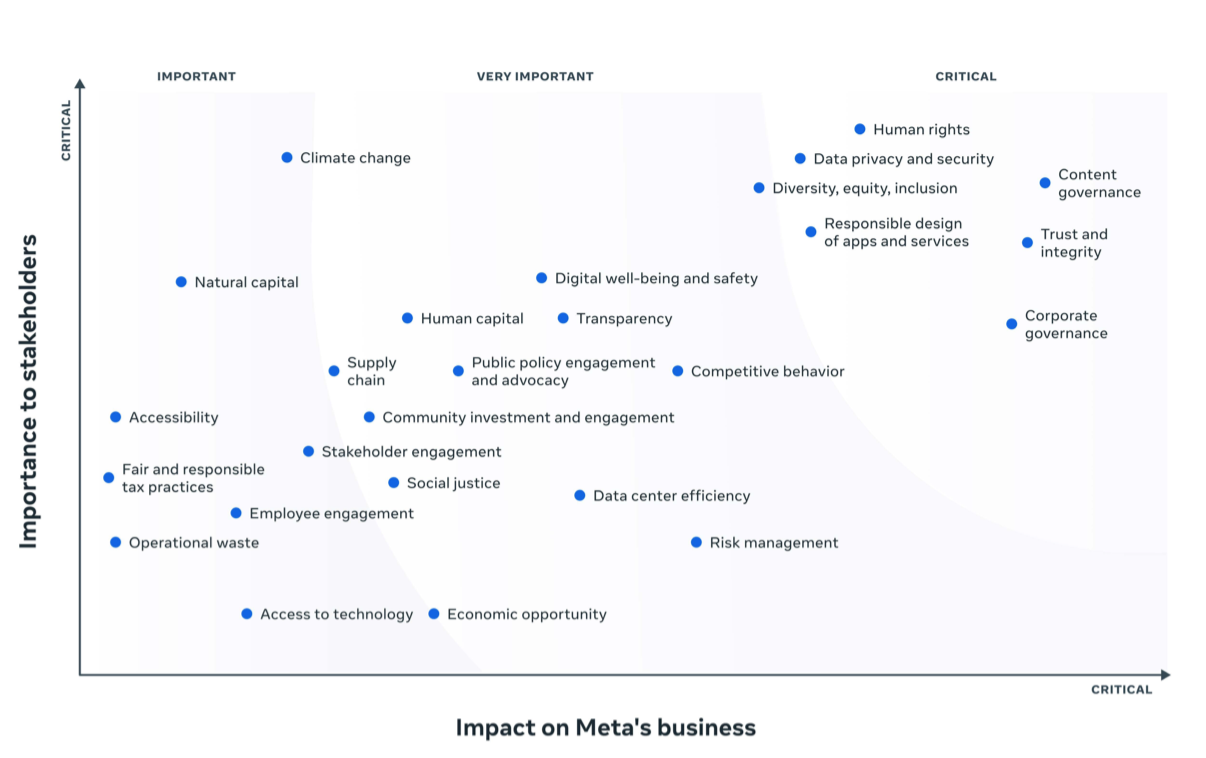
Recent News
2025
Shared in an internal memo to employees that it would be ending the company’s diversity, equity, and inclusion (DEI) programs, including for hiring, training and choosing suppliers, due to the changing “legal and policy landscape” in the U.S. The company will no longer have a dedicated DEI team, with the Chief Diversity Officer moving to a new role focused on accessibility and engagement. “Having goals can create the impression that decisions are being made based on race or gender. While this has never been our practice, we want to eliminate any impression of it,” said Meta's VP of People in the memo. (Jan 2025)
2024
Announced a Request for Proposals (RFP) to identify nuclear energy developers to provide 1-4 GW of new nuclear generation capacity in the U.S. (for delivery in the early 2030s), to help meet Meta’s AI innovation and sustainability objectives. Initial intakes are due 3 January 2025, and initial proposals are due 7 February 2025. (Dec 2024)
Sustainable Steel Buyers Platform (SSBP) — Announced that a new member, CEF member Meta, joined the SSBP. It also launched a Request-for-Proposals for producers to submit bids for the delivery of at least one million tons of near-zero emissions iron and steel by 2028. Submissions are due by 20 December 2024. (Nov 2024)
DCFlex —Launched by EPRI (The Electric Power Research Institute), this new initiative will explore how data centers can strengthen the electric grid, enable better asset utilization, and support the clean energy transition. DCFlex will establish 5-10 flexibility hubs, demonstrating innovative data center and power supplier strategies that enable operational and deployment flexibility, streamline grid integration, and transition backup power solutions to grid assets (with demonstration deployment starting in the first half of 2025). Founding members include CEF members: Duke Energy, Google, Meta, and NRG Energy. (Nov 2024)
Announced it is pledging at least $35 million for carbon removal projects in the coming year as part of its goal to achieve net zero across its value chain in 2030. The commitment is in response to the U.S. Department of Energy’s Carbon Dioxide Removal Purchasing Challenge. (Oct 2024)
Signed a long-term contract with Brazil-based BTG Pactual Timberland Investment Group for the delivery of 1.3 million nature-based carbon removal credits, with options for an additional 2.6 million credits through 2038. The credits will come from the conservation, restoration, and planting of deforested and selected regions in Latin America, including the Cerrado biome in Brazil. (Sept 2024)
Announced it is leaving Frontier, the coalition of corporations working to advance markets for carbon removal technologies, to source carbon removal deals independently. Existing Frontier members informed Axios that Meta’s departure would not affect existing deals made and that the coalition is on a path to over $1 billion tons of purchases by 2030. (Sept 2024)
META / SAGE GEOSYSTEMS — Announced a first-of-its-kind partnership to use advanced geothermal technology to supply up to 150 MW of power for Meta’s data centers. Sage’s technology taps energy in hot, dry rock rather than traditional hydrothermal formations, making it potentially broadly applicable in the U.S. The first phase of the project aims to be online in 2027. (Sept 2024)
iMasons Climate Accord (ICA) — The ICA, a coalition focused on carbon reduction of digital infrastructure, published an open letter from its Governing Body, including CEF members Amazon, Google, Meta, Microsoft, and Schneider Electric (along with Digital Reality). The letter encourages vendors to create certified Environmental Product Declarations (EPDs), align them with existing standards, and make them readily available. EPDs, the letter explains, enable the digital infrastructure and data center industry to both estimate its emissions and use that information to procure lower-carbon materials and equipment, helping to meet its climate goals. (July 2024)
The Global Media Sustainability Framework (Global Alliance for Responsible Media (GARM) and Ad Net Zero) — This first-of-its-kind framework enables advertisers, media owners, and agencies to measure greenhouse gas emissions, with the aim of reducing their carbon impacts. It includes formulas for digital, television, and out of home advertising (with print, audio, and cinema to follow), as well as data request and disclosure forms. It is supported by 30 companies, including CEF members Google, Mastercard, Meta, and Unilever. The next phase will be to establish an efficient system to transfer emissions data between buyers and sellers (with validation of media GHG data). Uptake and adoption will be tracked, with the first results published in Q2 of 2025. (June 2024)
Symbiosis — A new coalition of corporate buyers of high-quality, nature-based carbon removals. It is an advance market commitment, of up to 20 million tons, to accelerate the demand for nature-based removals (similar to Frontier, but nature-focused). Founding members include Google, Meta, Microsoft, and Salesforce, all CEF members. (May 2024)
Zero Emission Maritime Buyers Alliance (ZEMBA) — Over a dozen ZEMBA members (including CEF members Amazon, Meta, and REI Co-op) have collectively committed to purchase the environmental attributes associated with over one billion twenty-foot shipping container-miles of zero-emission shipping on a route from Singapore to Rotterdam, Netherlands in 2025-2026, which should collectively avoid at least 82,000 metric tons of CO2 equivalent. This is ZEMBA’s first tender for ocean shipping that achieves at least a 90% reduction of greenhouse gas (GHG) emissions on a lifecycle basis relative to fossil fuel powered service. Container shipping company Hapag-Lloyd was selected as the winner of ZEMBA’s inaugural tender. (April 2024)
Sustainable Aviation Buyers Alliance (SABA) —
Announced the largest ever collection of deals to purchase high-integrity sustainable aviation fuel certificates (SAFc). Fifteen companies (including
CEF Members JPMorgan Chase, Meta, Morgan Stanley, Netflix, and Samsung) have committed nearly $200 million over five years to purchase SAFc (equal to about 50 million gallons of SAF). (April 2024)
2023
Cargo Owners for Zero Emission Vessels (coZEV) — Added 10 freight-buying companies to its ranks, bringing the total to over 35. The announcement is part of the Green Shipping Challenge, a US-Norway joint initiative to reduce emissions from shipping. Among the new members are CEF members Meta and REI Co-op. (Dec 2023)
Clean Energy Procurement Academy — This project aims to equip companies with the technical readiness to explore and adopt clean energy. The Academy will combine online and in-person training and educational resources to help accelerate the integration of clean energy into global supply chains (for example, how to boost supply chain companies’ capacity to invest in renewables). This project was initiated through the Clean Energy Buyers Institute and with support from Google.org, and is co-founded by CEF Members by Amazon, Apple, Meta, PepsiCo, and REI; and by Nike. (Oct 2023)
ZEROgrid Initiative — Several companies, including CEF members General Motors, Meta, and Salesforce, are joining RMI to launch the Zero-Emissions | Reliability Optimized Grid Initiative (ZEROgrid), a comprehensive roadmap to accelerate the transition to a zero-emissions grid. ZEROgrid will start by building a holistic framework defining targeted metrics for engagement and impact informed by reliability and emission experts. It then aims to maximize grid reliability and emissions reductions through enabling sustained, high-impact corporate action across clean energy procurement, policy, investment, R&D, and operations. (July 2023)
FRONTIER — Facilitated a set of offtake agreements with Charm Industrial. This $53 million deal will sequester 112,000 tons of CO2 from the atmosphere between 2024 and 2030, storing it underground. Charm collects waste biomass from agriculture or forest management and, through pyrolysis, converts it into a bio-oil that will be injected permanently into regulated wells. The amount contracted is about ten times the amount of permanent atmospheric removal worldwide thus far and about 18 times more than Charm has sequestered to date via pilot processes. (May 2023)
The Open for Business Coalition, made up of 34 global companies, denounced anti-LGBTQ legislation passed by Uganda's parliament last week, warning it would curb investment flows, deter tourists, undermine companies’ ability to hire a diverse workforce, and damage the country's economy. The legislation criminalizes identifying as gay, lesbian, bisexual, transgender or queer, and imposes the death penalty for “aggravated homosexuality.” The coalition includes CEF members Dow, Google, JP Morgan Chase, Mastercard, McKinsey & Co., Meta, Microsoft, and Unilever. (April 2023)
2022
Emissions First Partnership — Ten corporations have come together to offer new objectives and principles for consideration to update electricity greenhouse gas emissions accounting systems to accelerate grid decarbonization. Objectives include increasing clarity on emissions impact of electricity, improving data, and increasing stakeholder confidence that emissions reduction claims are accurate and effective. CEF members include: Amazon, General Motors, and Meta. (Dec 2022)
Asia Clean Energy Coalition (ACEC) — ACEC aims to drive corporate clean energy procurement in Asia, accelerating its overall demand and supply. ACEC will strategically improve the policy and regulatory environments for clean energy, in both national and regional Asian markets. The coalition seeks to align the world’s leading clean energy buyers, project developers and financiers, to help policymakers, utilities and energy regulators innovate and deploy cost effective clean technologies across the Asia-Pacific region. Founding members include CEF members Amazon, Apple, Cisco, Google, Meta, and Samsung. (Nov 2022)
New Secretariat to Address Connected Device Emissions — Global climate consultancy, the Carbon Trust, and technology companies Amazon, Meta, Microsoft, Samsung and Sky, are developing the industry’s first specification for measuring, accounting for, and decarbonizing the emissions associated with connected devices while being used by customers. Connected devices, which include phones and laptops, used a total of 500 Terawatt hours in 2020. The group aims to produce an accurate baseline for reporting energy efficiency improvements and establish rules for matching electricity consumption with renewable energy generation, as well as applying technology to optimize energy use of connected devices by consumers. (Sept 2022)
Energy Storage Solutions Consortium — Companies including Meta, REsurety, Broad Reach Power, and others have announced the formation of a new consortium to assess and maximize the greenhouse gas (GHG) reduction potential of electricity storage technologies. The consortium’s goal is to create an open-source, third-party-verified methodology to quantify the GHG benefits of certain grid-connected energy storage projects. This standard, once approved by Verra, would be the first verified methodology to quantify the emissions benefits of large-scale energy storage facilities. (Sept 2022)
New research from the Yale Program on Climate Change Communication and Data for Good at Meta describes climate change beliefs, attitudes, policy preferences, and behaviors among Facebook users in 110 countries, territories, and geographic groups. Selected findings include (July 2022):
- Most respondents in 46 of the areas surveyed say they know at least a moderate amount about climate change, and when presented a brief explanation of climate change, the vast majority of respondents indicated a belief that climate change is happening - even the lowest percentage expressing belief came in at 67% of respondents (Laos and Haiti).
- In 25 surveyed areas, respondents are more likely to think that businesses are most responsible for reducing the pollution that causes climate change, led by Germany and Mexico (both 43%), with 36% of respondents in the U.S. believing so. In 42 surveyed areas, respondents are more likely to think that the government is most responsible for reducing the pollution that causes climate change.
- In the U.S. 45% believe addressing climate change will have economic benefits, while 29% believe impacts may be negative.
- In the U.S. a majority (52%) support increasing renewables “much more” and an additional 22% “somewhat more.” A majority (58%) supported reducing fossil fuels.
FRONTIER — Carbon removal funding venture Frontier has announced its initial spend of $2.4 million, facilitated on behalf of funding partner Stripe, to be allocated among six carbon removal startups. The Frontier Fund, with a current total of $924 million from Alphabet, CEF members Meta and McKinsey & Co., Shopify, and Stripe, was established as an advance market commitment (AMC) guaranteeing future sales for companies working to develop carbon removal technologies and scale operations. Frontier is the first customer for each of the six companies selected, and another round of funding to additional recipients is planned for the fall. (July 2022)
Frontier Fund — Stripe, with supportive funding from Shopify and CEF members Alphabet (Google), Meta, and McKinsey & Co., launched an Advance Market Commitment" (AMC) fund to buy an initial $925 million of permanent carbon removal by 2030. Inspired by vaccine development funding mechanisms, the fund intends to scale solutions that meet several criteria, including the ability to permanently store carbon over 1,000 years, cost less than $100 per ton at scale, sequester at least 0.5 gigatons of carbon annually, and be verifiable. Notably, as emphasized on the Frontier website, “Frontier aims to help create net new carbon removal supply rather than compete over what exists today.” Other companies are encouraged to participate. (April 2022)
Corporations bought a record 31.1 gigawatts of clean energy through PPAs in 2021,up nearly 24% since 2020 and equivalent to over 10% of renewable energy capacity added globally, according to BloombergNEF. Technology companies bought the most clean energy, and the top 10 corporate buyers overall include CEF members Amazon (#1), Microsoft (#2), Meta (#3), BASF (#4), and Google (#6). (Feb 2022)
2021
Civil Rights Audit: The Rationale for and Key Elements of a Business (Laura Murphy, former director of the ACLU Washington Legislative Office) — Outlines the business case for a civil rights audit, key elements, and distinctions between such audits and DE&I initiatives. Shares key outcomes of civil rights audits and assessments done by Airbnb, Meta, Starbucks, and Uber. (Dec 2021)
Algorithmic Bias Safeguards for Workforce (the Data & Trust Alliance) — A new set of criteria and educational resources to help companies in the alliance “mitigate data and algorithmic bias” in HR and workforce decisions, and evaluate vendors’ “commitment to algorithmic safety.” 13 companies in the alliance will adopt the Safeguards, including CEF members General Motors, Mastercard, and Meta. (Dec 2021)
Eco-Skies Alliance — 12 companies, including CEF members Meta, Microsoft, and Visa, joined United Airlines’ corporate alliance to reduce aviation-related environmental impact and create demand for sustainable aviation fuel (SAF). Existing signatories have collectively contributed to the purchase of over 7 million gallons of SAF this year—enough to eliminate approximately 66,000 metric tons of GHG emissions. (Dec 2021)
Pledged to be “water positive” across its global operations by 2030 through investments in water-restoration projects in water-stressed regions, onsite recycled water systems, and the development of new operational efficiencies and technologies. The water-restoration projects are expected to replenish over
850 million gallons annually. (Aug 2021)
MORE »
Nearly 100 leaders of companies, associations, and organizations—including CEF members
Facebook, Microsoft, Apple, Hewlett Packard Enterprise, Amazon, Alphabet, General Motors, Mastercard, HP Inc., Cisco,
and
TPG Capital—sent a letter urging Congress to pass legislation to create a pathway to citizenship for the “Dreamers”—who would benefit from the Deferred Action for Childhood Arrivals program. The leaders were organized by the
Coalition for the American Dream. (Aug 2021)
MORE »
Over 150 companies that belong to the Business for Voting Rights Group, including CEF members
Amazon, Apple, Cisco, Facebook, Google, HP, Microsoft, PepsiCo, and
Unilever,
sent a letter to U.S. lawmakers urging them to reintroduce and pass the John Lewis Voting Rights Advancement Act, which would help prevent voting discrimination and establish an improved system for states to report changes to election law. (July 2021)
MORE »
RE100
— The RE100 companies, which are committed to 100% renewable electricity, now have an electricity demand greater than that of the U.K. or Italy and are on track to save CO2 emissions equal to burning over 118 million tons of coal per year. RE100 members include
CEF Members:
3M, Apple, Bank of America, Bloomberg, Dell Technologies, Ecolab, Facebook, General Motors, Google, Hewlett Packard Enterprise, HP Inc., Johnson & Johnson, JPMorgan Chase & Co., Mastercard, McKinsey & Co., Microsoft, Morgan Stanley, PepsiCo, Procter & Gamble, Siemens AG, TD Bank Group, Trane Technologies, Unilever,
and Visa.
(July 2021)
MORE »
Google parent Alphabet, Amazon, Autodesk, eBay, Facebook, Intel, and Salesforce urged the SEC to mandate regular corporate climate-related disclosures. They said the SEC should utilize existing frameworks to ensure disclosure consistency and comparability and that businesses should measure and report relevant GHG by relevant global standards. (June 2021)
MORE »
Low-Carbon Patent Pledge —
An HPE-led initiative in collaboration with Facebook and Microsoft, pledging to make over 400 patents applicable to the development, storage, and distribution of low-carbon energy technology royalty-free to the public.
Additional patent owners may join. (April 2021)
MORE »
Hundreds of executives, nonprofits, and companies—including Amazon, Apple, Bank of America, BlackRock, Cisco, Dell Technologies, Facebook, Ford, General Motors, Google, JetBlue, Johnson & Johnson, Mastercard, and McKinsey & Co.—signed a public statement opposing “any discriminatory legislation.” The statement, titled “We Stand for Democracy,” was featured in advertisements in the New York Times and The Washington Post. (April 2021)
More than 300 businesses representing over $3 trillion in annual revenue and employing nearly 6 million US workers signed an open letter calling upon President Biden to adopt a GHG emissions reduction target of at least 50% by 2030 (2005 baseline). Organized by the We Mean Business coalition and Ceres, signatories of the letter included: Apple, Dell Technologies, Facebook, Google, Hewlett Packard Enterprise, HP, Johnson & Johnson, Mastercard, McDonald’s, Microsoft, Siemens, Trane Technologies, Unilever, and VF Corporation. (April 2021)
Announced its operations reached net-zero emissions and have operated on 100% renewable energy since 2020, accomplishing its 2018 goal. It has reduced GHG emissions 94% over the last 3 years, surpassing its initial 75% reduction target. (April 2021)
Companies across the country—including Apple, BlackRock, Bank of America, Cisco, Facebook, JPMorgan Chase, Microsoft, and UPS—denounced the state of Georgia’s new law overhauling state election procedures over concerns it will restrict voter access and disproportionately disenfranchise people of color. Dozens of Black executives have called on companies to stand up for racial justice by fighting a wave of similar restrictive voting bills being advanced by Republicans in at least 43 states. (April 2021)
The Renewable Energy Buyers Alliance updated its “Deal Tracker,” highlighting the largest corporate renewable energy purchasers in 2020. The top 10 included the following (February 2021):
- Amazon (3.163 GW)
- Google (1.040 GW)
- Verizon (.840 GW)
- McDonald’s (.750 GW)
- Facebook (.725 GW)
- General Motors (.610 GW)
- Nucor (.325 GW)
- Evraz North America (.300 GW)
- Lowe’s (.250 GW)
- Nestlé (.250 GW)
A major new coalition, “America is All In,” launched to mobilize bold climate ambitions nationally and uphold the federal government’s commitment to climate action—specifically to cut U.S. emissions in half or more by 2030 and reach net-zero by 2050. Co-led by UN Special Climate Envoy Michael Bloomberg, the coalition effectively merges We Are Still In and America’s Pledge and is the most expansive effort ever assembled to support climate action in the U.S., involving U.S. businesses, cities, states, tribal nations, schools, and faith groups, health care organizations, and cultural institutions. Large companies involved include: 3M, Adobe, Amazon, Apple, ADM, Autodesk, BASF, Best Buy, Cargill, Carrier Corporation, The Clorox Company, Coca-Cola, Danone N.A., Dell Technologies, Dow Inc., DSM N.A., DuPont, eBay, Edison International, Facebook, Gap, General Mills, Google, Hewlett Packard Enterprise, HP, Inc., IKEA U.S., Johnson & Johnson, Johnson Controls, Kellogg Company, LafargeHolcim, Levi Strauss & Co., L’Oréal, Mars Incorporated, McDonald’s, Microsoft, Mondelez International, National Grid, Nestle, NIKE, Novozymes, PG&E Corporation, PepsiCo, Salesforce, Siemens, Sony Corporation of America, Starbucks, Steelcase, Target, Tiffany & Co., Trane Technologies, Verizon, VF Corporation, Walmart, and Waste Management. (February 2021)
Facebook expanded its Climate Science Information Center, an online portal to counter climate change misinformation and steer users towards trusted resources from leading climate change organizations. (February 2021)
The Renewable Energy Buyers Association (REBA) issued a statement signed by 36 companies — including Amazon, Clorox, Facebook, GM, Google, Johnson & Johnson, McDonald’s, Microsoft, PepsiCo, and Unilever — proposing federal policy priorities to help accelerate the adoption of a customer-centric clean energy transition. Priorities include: 1) expanding and enhancing wholesale energy markets; 2) harmonizing clean-energy procurement and standards; 3) supporting the innovation and commercialization of energy R&D. (January 2021)
The World Economic Forum
launched Partnering for Racial Justice in Business Initiative, a new coalition to build more equitable and just workplaces. Three steps required to join the initiative include: 1)
Racial and ethnic equity must be placed
on the board’s agenda; 2) Companies must
make at least one commitment towards racial and ethnic justice in their organizations; 3) Companies must put a
long-term strategy in place towards
becoming an anti-racist organization. Founding members include
Bank of America, BlackRock, Bloomberg, Cisco Systems, Facebook, Google, HP, Johnson & Johnson, Kaiser Permanente, Mastercard, McKinsey & Company, Microsoft, PepsiCo, Procter & Gamble, Unilever,
and UPS.
(January 2021)
MORE
»
2020
Facebook launched a new Climate Science Information Center on Facebook to help provide people with access to climate information based on scientific research and data from leading organizations.
Facebook signed a power purchase agreement with Apex Clean Energy to source 170 MW of renewable power from the Lincoln Land Wind project in Illinois. (August 2020)
Facebook will invest $100 million in the news industry and support fact-checkers to help limit the spread of COVID-19 misinformation across its applications. The company will also invest $100 million in small businesses, match $20 million in donations to support COVID-19 relief efforts, and donate $25 million to support frontline healthcare workers. (April 2020)
The Renewable Energy Buyers Alliance updated in February 2020 its “Deal Tracker,” which highlights the largest corporate renewable energy purchasers in 2019. The top 10 included the following:
- Facebook (1.546 GW)
- Google (1.107 GW)
- AT&T (.960 GW)
- Microsoft (.624 GW)
- T-Mobile (.581 GW)
- Walmart (.541 GW)
- Amazon (.487 GW)
- Ball Corporation (.388 GW)
- McDonald’s (.380 GW)
- Honda (.320 GW)
How can we help? Please reach out to us!
Laura Keenan, Chair
laura@corporateecoforum.com | (617) 921-2307
Amy O’Meara, Executive Director
amy@corporateecoforum.com | (857) 222-8270
Mike Rama, Deputy Director
mike@corporateecoforum.com | (607) 287-9236
Margaret Zamoyta, Program Lead
margaret@corporateecoforum.com I (917) 678-4161
MR Rangaswami, Founder
